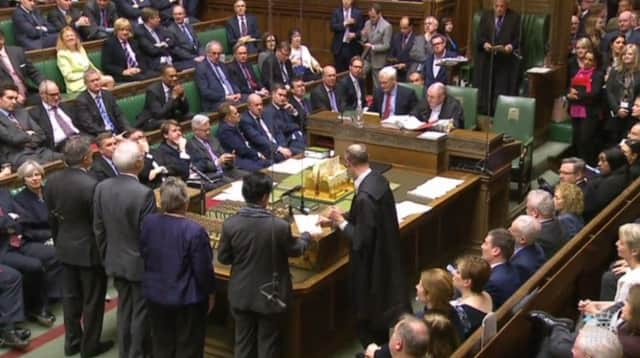MPs reject Lords amendments to Theresa May's Brexit Bill


The last hurdle before the UK government notifies the EU of its intention to leave was expected to be cleared last night with peers rubber-stamping the European Union (Notification of Withdrawal) Bill despite having their changes rejected.
But the Prime Minister will wait until nearer the end of the month before kicking off the two-year process of negotiating departure under Article 50 of the Lisbon Treaty.
Advertisement
Hide AdAdvertisement
Hide AdMrs May’s official spokesman played down suggestions that the PM had delayed notification due to Scottish First Minister Nicola Sturgeon’s announcement that she plans to stage a second independence referendum in the run-up to Brexit in spring 2019.
If the Lords decides not to contest the rejection of its amendment by the Commons, as expected, Mrs May needs only to await Royal Assent of the European Union (Notification of Withdrawal) Bill before triggering Article 50.
There was widespread speculation in Westminster that she could do so as early as today, when she is scheduled to make a statement on Europe to the Commons.
But her spokesman said Mrs May had always said she would notify the European Council of the UK’s intention to leave by the end of March, adding: “I’ve said ‘end’ many times but it would seem I didn’t put it in capital letters strongly enough.”
Notification in the last week of March would not only avoid clashing with the general election taking place on Wednesday in the Netherlands, but would also delay the formal opening of negotiations until after a special summit in Rome on 25 March when the remaining 27 member states will celebrate the EU’s 60th anniversary.
The Prime Minister’s European counterparts had been prepared for her to make an announcement this week, with 6 April pencilled in as the date for a meeting of the 27 other EU leaders to respond to the situation – a gathering which will now be pushed back until later that month.
MPs last night rejected a Lords amendment to guarantee the status of EU nationals resident in the UK by a margin of 335 votes to 287, and also overturned a second amendment, which would have required the government to grant Parliament a “meaningful” vote on the withdrawal deal eventually secured by Mrs May, by 331 votes to 286.
The SNP’s Alex Salmond claimed government promises over the single market had been “swept aside” in favour of pursuit of a hard Brexit.
Advertisement
Hide AdAdvertisement
Hide AdReferring to Ms Sturgeon’s announcement, the former first minister said: “Today in Scotland, perhaps the government were disabused of that notion because there might not be a real vote, a meaningful vote in this chamber, but there shall be a meaningful vote in Scotland about protecting our millennium-long history as a European nation.”
The bill was due to return to the Lords in the first stage of “parliamentary ping-pong” which was expected to conclude last night.
Urging MPs to reject the Lords amendments, Brexit Secretary David Davis said the majority of voters wanted Mrs May to “get on with the job in hand and to do so with no strings attached”.
Mr Davis told MPs he felt a “moral responsibility” towards four million EU nationals in Britain and UK expats living on the Continent and wanted swift agreement on their status.
He said he hoped a guarantee of their future rights would be confirmed in an exchange of letters in advance of the completion of the final deal, to end uncertainty for foreign nationals as quickly as possible.
He warned that calls for a parliamentary vote on the deal could be interpreted as an attempt by MPs or peers to defy the will of the British people.
“Whilst it has been badged as a meaningful vote, the reality is there are some who would seek to use this to overturn the result of the referendum,” he said.
“Any prospect that we might actually decide to remain in the European Union would only serve to encourage those on the other side to give us the worst possible deal in the hope we will do exactly that.”